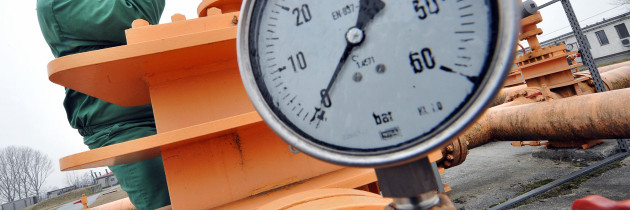Europe’s Shale Business in Race Against Time
EUROPE’S FRACKING PROBLEMS
The question of whether North America’s shale success can or will be replicated elsewhere is often quite narrowly constructed around the amount of gas that could, potentially, be underground. In the U.K., for example, a geological survey has estimated some 1.3 quadrillion cubic feet of gas is contained within the shale formations under the Bowland area in northwest England.
While a big question mark hangs over how much of that huge amount is recoverable, in Europe size isn’t everything.
Anyone wishing to create the ideal conditions for a shale-gas industry would likely end up with the American model, Bloomberg New Energy Finance’s Michael Liebreich says: the winning combination of great geology, low population densities, an existing pipeline network, a fragmented regulatory environment, landowners with subsurface mineral rights, and a liquid market for rigs and drilling services.
Europe has few of these attributes.
Within the European Union, member states are free to set their own rules—witness France’s highest court upholding a ban on fracking—but are ultimately subservient to the European Commission. The executive body should issue its own proposals on fracking by the end of this year; each and every project will likely be required to undertake an environmental review, regardless of size.
Geologically, Europe just doesn’t cut it for fracking in the way North America does.
The Barnett shale in Texas spreads across 5,000 square miles; Marcellus, in the northeast, is 10 times larger still—about the size of the U.K. Population density in Texas is 93 people a square mile, according to the 2007 census; in the U.K., one of the greatest European evangelists for shale production, the figure is nearer 1,000.
This in turn causes localized disputes, such as the one near the village of Balcombe, southern England, where the suitability of a site was questioned, and very specific concerns about pollution. And land rights are becoming an issue.
On infrastructure, Europe is taking slow steps toward a greater tomorrow. The commission has just published a list of 250 projects that may qualify for funding, nearly half of which are in the field of gas transmission.
Bloomberg NEF’s Mr. Liebreich says that not even shale-gas extraction companies believe fracking will have much impact on gas prices, and points out that in the U.S. prices have bounced back sharply but aren’t yet at the level needed to justify continued high-cost drilling.
While the presence in Europe of some of the world’s largest oil-field services groups points to their belief in a bright future for fracking in the region, the likes of Baker Hughes and Halliburton are in a race against time. A European shale-gas industry would be more viable if it can be up and running before North America gets its export act together and cheap gas finds its way into other markets.
Europe is playing catch-up.
TALKING WITH IRAN
Talks have resumed in Geneva on Iran’s nuclear ambitions. Iranian President Hassan Rouhani’s olive branch of a phone call with Barack Obama has gone a little way to rolling back the mutual suspicion that has been the hallmark of Iranian-U.S. relations since 1979.
Iran’s new government says it wants to continue enriching uranium for civilian uses, and over the weekend declared it wouldn’t ship nuclear materials out of the country, The Wall Street Journal’s Jay Solomon reports.
But key U.S. allies in the region, particularly Israel and Saudi Arabia, insist that Tehran should be denied any facilities to either enrich uranium or produce weapons-grade plutonium because of the potential for military uses, according to U.S. and Arab officials. Members of Congress also are pressuring the White House to seek a complete dismantling of Iran’s centrifuge machines.
A resolution could be key to allowing more than one million barrels of Iranian crude oil back out onto world markets. Western governments are wary, the Washington Post says; France, particularly, may be prepared to take a harder line, John Vincour writes in the Journal.
Both sides will demand goodwill, Christian Science Monitor reports. Finding a balance will be key in Geneva. That the meeting is overshadowed by events on Capitol Hill may be a blessing.
MARKETS
Brent crude-oil futures slipped back Tuesday but held above $110 a barrel, with subdued volumes expected as investors await news from key meetings in Washington and Geneva. Read the Journal’s latest oil-markets report here.
Fonte: blogs.wsj.com



